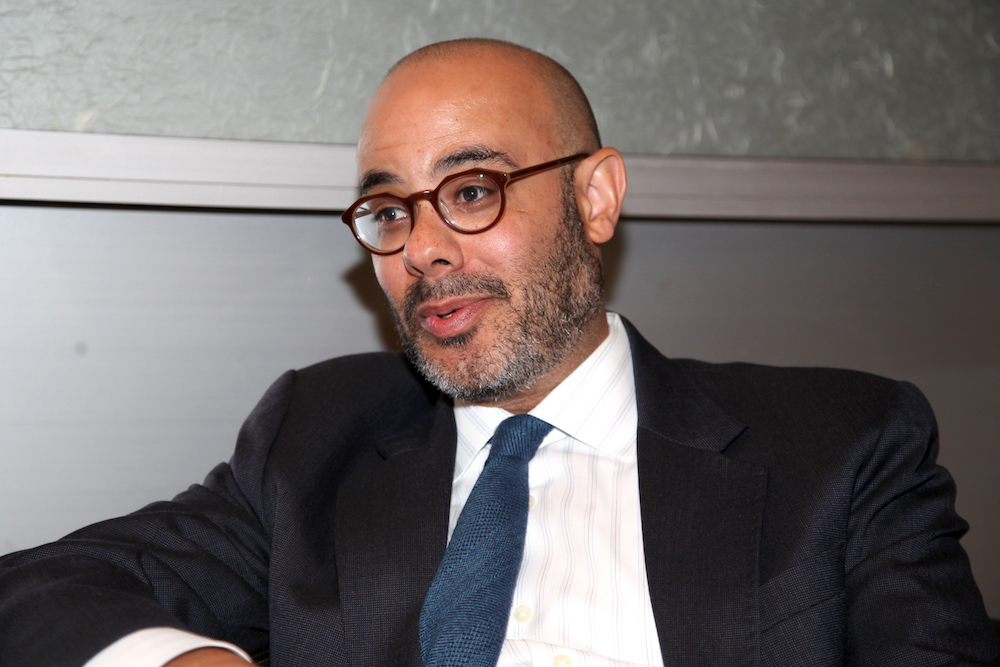
Photo by Aaron Salcido.
Justin Driver is the Harry N. Wyatt professor of law at the University of Chicago Law School and author of The Schoolhouse Gate: Public Education, the Supreme Court, and the Battle for the American Mind. Driver clerked for Judge Merrick Garland, Justice Stephen Breyer, and Justice Sandra Day O’Connor. Prior to attending law school, he taught civics and American history to high school students. Before joining a Zócalo/UCLA Downtown event titled “How Will the New Supreme Court Change America?” he spoke in the green room about Matthew McConaughey, “Bong Hits for Jesus,” and how students can fight their school administrations.
Who is your favorite lawyer from TV or the movies?
I could say Ruth Bader Ginsburg—is this cheating? She was in that documentary. My daughter would be disappointed if I didn’t mention her.
How about a favorite fictional lawyer?
Matthew McConaughey’s portrayal of the attorney in A Time to Kill. I can still call up his closing argument in defending the character portrayed by Samuel L. Jackson.
What Supreme Court Justice, living or dead, would you most want to have a drink with?
Thurgood Marshall is a hero of mine and has been since elementary school. I would love to hear the stories that he told. He was reported to be a magnificent storyteller. My old boss Justice O’Connor wrote a piece about him in the Stanford Law Review called “The Influence of a Raconteur.”
What book about the Supreme Court have you found most useful?
There are many good books, but Richard Kluger’s Simple Justice is a magnificent work. It tells the very long story of the road to Brown v. Board of Education. And it brings to light the stories of litigants, not just the lawyers.
What’s the biggest misconception people have about the Supreme Court?
Well, I would say that in legal academia, which is slightly different than the public, many people believe that the Supreme Court is a frail institution, a fragile institution. It’s not. The biggest misconception is that the Supreme Court marches in lockstep with the views of the American people as a whole. I believe the Supreme Court possesses a much larger capacity for countering majoritarian preferences of the public than many in legal academia believe.
What question do your students most often ask you?
One of the questions they don’t ask me often is: is this going to be on the test? One question they do ask quite often: What’s it like to be a law clerk at the Supreme Court?
What is your favorite place to eat on the South Side?
There’s a place called Harold’s Chicken Shack that makes unbelievable chicken.
You taught high school—civics and American history. What do you remember most from that experience?
That it was quite a physically demanding job. It was intellectually demanding as well, but I remember the physical demands. I have enormous respect for public school teachers as a result of my experience there.
You’ve written about how public school students have lost rights through the courts. What advice would you give to public school students who find themselves in conflict with school administrators over their rights?
My answer would be that if it’s a case involving freedom of speech, they should be careful to make it clear how their preferred speech is connected to larger political battles, rather than simply saying they wanted to wear some clothing or have hair of a certain length “just cause” [just because they want to]. I write about a case called “Bong Hits for Jesus” in my book where a student [who had a sign saying that] said he was just trying to get the attention of television cameras for his speech. It would have been much wiser for him to say he wanted to participate in the burgeoning legal debate about marijuana.
What teacher most influenced you?
I was lucky to have a great deal of incredibly influential instructors. I had a professor in college at Brown University named James T. Patterson, who I worked for as a research assistant when he was working on a book on Brown v. Board of Education. And that experience was instrumental in shaping my career as an academic. And I had professor Randall Kennedy at Harvard Law School. But I would be remiss if I didn’t mention Ms. Wickersham, who I had at Alice Deal Junior High School in Washington, D.C. She arrived directly from graduating Yale College. From her example, she suggested that mortal human beings could go to Ivy League schools.



